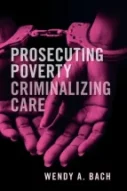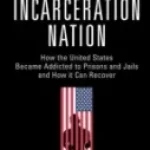Prosecuting Poverty, Criminalizing Care
 Author: Wendy A. Bach
Author: Wendy A. Bach
Publisher: Cambridge University Press, 2022. 300 pages.
Reviewer: Meghan Boone | September 2023
In Wendy Bach’s devastating new book, Prosecuting Poverty, Criminalizing Care, she defines real care as inextricable from dignity—for an individual, a family, and a community. Bach’s book paints a troubling portrait of how criminally prosecuting pregnant people who use drugs fails to live up to this aspiration. Instead, it undermines and corrupts the concept of care itself.
The book is based on Bach’s archival research into the cases prosecuted under Tennessee’s short-lived fetal assault law, as well as interviews conducted by SisterReach, a non-profit based in Memphis, Tennessee that works with and for pregnant women affected by substance use disorders. The import of the book extends far beyond the source material, however, touching on how this law reflects not only the growing criminalization of prenatal drug use at the national level, as well as how the carceral and care systems in the United States have become hopelessly intertwined. Bach’s research is an important contribution to understanding the broader problems of racism and poverty that both create and sustain this carceral-care system.
In the first three chapters, Bach details the conversations that surrounded the passage of Tennessee’s Fetal Assault Law and situates them within a larger historical context. The legislative history of the Tennessee law reveals real concern about the increase in Neonatal Abstinence Syndrome (NAS) and a belief that it was only through criminalization that pregnant women could be connected with addiction treatment. As Bach points out, however, these conversations failed to diagnose the real problems—poverty and trauma—that accounted for the negative outcomes that legislators sought to avoid. She argues that while the science linking prenatal drug use and actual harm to infants is inconclusive at best, the detrimental effects of poverty and trauma are well established by research. [1] More than that, however, Bach contends that even if prenatal drug use was the problem the Tennessee legislators sought to address, they utterly failed to challenge the background conditions that make the creation of a crime seem like the only available response. As Bach states, “[n]owhere among the statements of the proponents of the legislation is there any suggestion that this state of affairs—the seemingly overwhelming lack of resources available to support pregnant women struggling with addiction—might call not for the creation of a new crime but instead for the augmentation of community-based social support.” [2] In the third chapter, Bach connects the seeming inevitability of this carceral approach to prenatal drug use to a larger history, starting with the crack panic of the 1980’s and 90’s. She argues that while the racial makeup of prosecutions for fetal assault in Tennessee are different than the prosecutions for prenatal drug use in an earlier time, they both reflect a continued story of racial oppression.
Bach then spends the next two chapters detailing how the ‘care’ that was the supposed motivation for the law was entirely absent from the case files for most prosecutions for fetal assault that occurred under the law. Instead, the prosecutions for fetal assault “played out exactly as misdemeanors do throughout the United States every day in the lower courts of the American criminal legal system—targeting poverty, deepening poverty, and degrading justice.” [3] Even more so than other types of criminal defendants, however, these women were subject not only to the deprivations of liberty and devastating economic consequences of being caught up in the criminal legal system, but also to the risk that they would lose custody of their children through overlapping investigations by child protective services. It was this risk of custody loss that gave women accused of fetal assault such strong incentivizes to accept plea deals, even when they would likely have been able to successfully defend themselves against charges. As Bach points out, some of the charging documents lacked even basic allegations for each element of the alleged crime.[4] For these mothers at the margins of society, however, “the cost of fighting was just too high” and the child welfare agencies “hold all the cards.” [5]
Bach asks in the next three chapters, “what happens to care itself when care is criminalized?” [6] She answers this question by describing how, for the small percentage of women who actually do manage to access care through the criminal system, situating that care within the criminal system leads to additional negative outcomes: surveillance and degradation, risk of additional punishment, and decision making that is deeply corrupted by its proximity to punishment systems. [7] She does not dispute the current reality that for “folks in poor communities, the road to treatment runs through the agencies and courts”—indeed, her research underscores the difficulty for poor communities to access this care in any other way, as the lack of funding for non-carceral programs is almost non-existent. [8] Instead, she shows that accessing care inside the criminal system is a dangerous choice for women accused of prenatal substance use, one that could exacerbate the difficult circumstances they find themselves in and force them to choose treatment plans based on the opinions of judges and system actors instead of medical professionals. [9]
In the final chapter, Bach outlines some possible measures to counteract the bleak picture that the book paints. She is clear-eyed about this portion of the project, though, understanding that deeply ingrained biases and the overwhelming prevalence of structural subordination make the sort of radical reform she would prefer out of reach for the present. But she helpfully gives the reader two questions to guide her analysis of whether any proposed reform is desirable: “whether the proposal serves to separate care from punishment and whether it avoids transferring any additional resources to punishment institutions, be they in the child welfare or the criminal legal systems.” [10] In this spirit, she suggests reforms that would curtail the flow of information from care settings into criminal systems, abandoning child welfare rules that automatically categorize prenatal drug use as ‘severe abuse,’ rethinking the desirability of collaboration between system actors, and rejecting outright the idea that the creation of new crimes is the way to increase access to care. Bach notes that “virtually every professional interviewed for this book agreed that this was no way to build either a punishment system or a care system.” [11]
As Bach correctly points out, her book picks up on a line of scholarship developed by Dorothy Roberts, Khiara Bridges, and Michele Goodwin, among others, who reveal the specific surveillance and punishment systems built around reproduction and particularly the reproductive choices of Black and Brown women. Bach adds something meaningful to the discussion by not only meticulously combing through case files and interviewing a wide swath of system actors, but by detailing how many different systems—the criminal legal system, the healthcare system, the family regulation system—mutually reinforce the problematic treatment of racial minorities and poor women. Bach asserts that the racialized narratives that earlier scholars have noted are reflected in her own research, sometimes in new ways.
If there is a missed an opportunity in Bach’s book, it is to explore more deeply the specifically gendered nature of these prosecutions. Indeed, the prosecutions of mostly White women under the Tennessee law provides a unique opportunity to explore how race and gender intersect in fetal assault prosecutions. Although the provision of ‘care’ that Bach describes is deeply flawed (if it exists at all), even the feint towards care in this context suggests that gender is an animating force if for no other reason than criminal defendants who are not engaged in highly gendered reproductive labor often meet a system that does not even pretend to care for them. But Bach cannot be faulted for an inability to do everything within the scope of a single project, or for focusing on the clear and important race and class implications of the prosecutions she analyzes.
Even though the genesis of Bach’s project was the now-elapsed Tennessee Fetal Assault Law, it is a powerful rejoinder to any argument that the criminalization of pregnant drug use is an effective or desirable strategy. In her words, such an approach created “mostly a lot of punishment and a little bit of corrupted care.” [12] As more state legislatures seek to criminalize the reproductive choices of women following the Supreme Court’s decision in Dobbs v. Jackson Women’s Health Organization (2022), Bach’s book is an important reminder that such criminalization not only damages the women who are caught up in it but also damages the creation of effective and just care systems that promote a version of care grounded in human dignity. Only by “erect[ing] firm walls between systems that can punish and systems that deliver support” can we hope to achieve this vision of dignified care, a type of care that only the most privileged among us can currently access. [13]
Meghan Boone is an Associate Professor of Law at Wake Forest University School of Law.
[1] Wendy A. Bach, Prosecuting Poverty, Criminalizing Care 39-41 (2022).
[2] Id. at 21-22.
[3] Id. at 122.
[4] Id. at 103-06.
[5] Id. at 106-39.
[6] Id. at 165.
[7] Id. at 126.
[8] Id. at 147, 150-51.
[9] Id. at 183-86.
[10] Id. at 193.
[11] Id. at 205.
[12] Id. at 193.
[13] Id. at 4.


